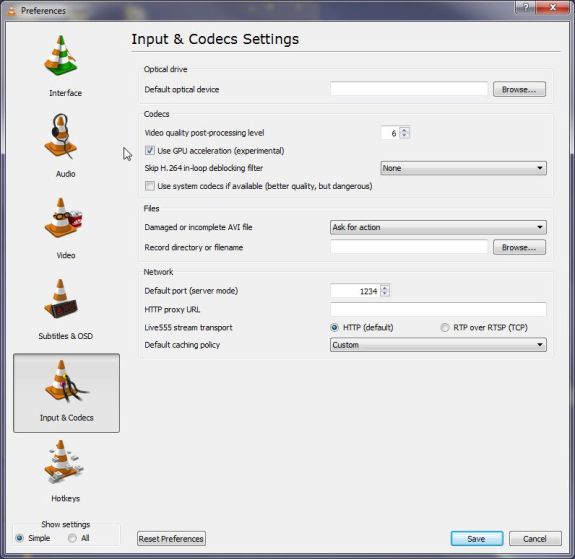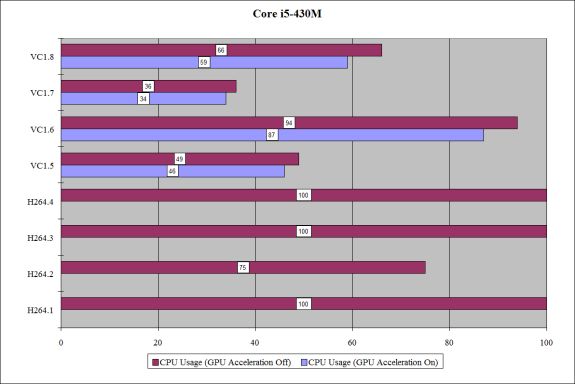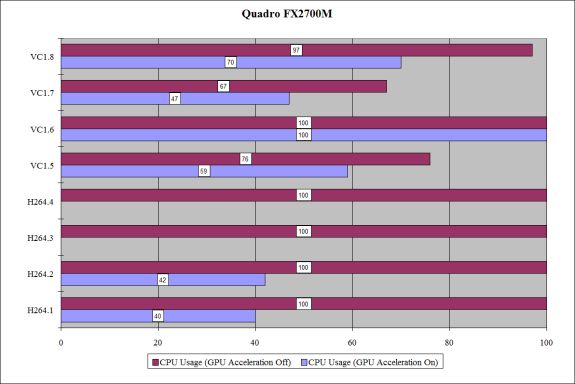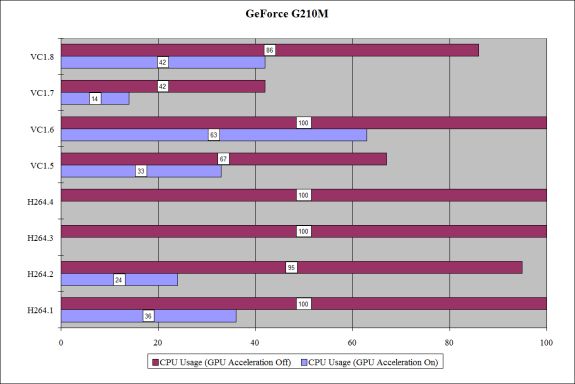HD Video Decoding on GPUs with VLC 1.1.0
by Ganesh T S on June 25, 2010 4:35 AM EST- Posted in
- Home Theater
- HTPC
After installing VLC 1.1.0, I was surprised to find that Blu-Ray sample clips continued to stutter during playback. I then realized that GPU acceleration was disabled by default. The option is hidden in the Preferences window accessible through the Tools menu.
The three graphs below show the maximum CPU usage during the course of playback with and without GPU acceleration (X-axis) for each of the 8 files listed in the previous section (Y-axis). A completely unwatchable video has no entry corresponding to it. Most of the videos showing 100% utilization were watchable except for a few stutterrs and dropped frames.
A quick look at the graph for the Intel i5-430M below show that the VLC - GPU interaction for H.264 is a complete failure. Upon initializing any H.264 stream, the screen turned completely green. On the other hand, VC-1 decode acceleration is not broken like H.264. CPU usage is lesser with acceleration turned on, but not by much. On being contacted with these details, VLC developer Jean-Baptiste Kempf indicated that the issue was quite simple, and was quite confident that the code would work as soon as the developer team had access to an Intel box.
Moving on to Nvidia's PureVideo VP2 decoder in the Quadro FX2700M, we find that both the L4.1 H.264 streams were accelerated without issues. However, L5.1 videos having more than 4 reference frames were rendered unwatchable due to extensive artefacting despite the fact that CPU usage remained low. From the same graph, we also find that VC-1 videos aren't accelerated as well as H264. This is due to the fact that the VP2 decoder doesn't provide VLD acceleration for VC1, but only IDCT. VLC manages to make use of the IDCT acceleration a little bit, but, obviously, the results are not as good as what one could achieve with VLD.
The GeForce G210M has Nvidia's latest PureVideo VP4 decoder (which supports acceleration for even MPEG-4 / DivX, but we are not testing those here). We observe that both H264 and VC-1 get accelerated as expected, but the L5.1 streams still have an issue. Jean-Baptiste Kempf seems to think that the L5.1 problem could be a result of issues with Nvidia's drivers as well as VLC code. A fix is expected once a bug report with a sample file is filed.














74 Comments
View All Comments
piroroadkill - Friday, June 25, 2010 - link
I use Media Player Classic Homecinema as well.Why would you bother with something else?
DustinW - Friday, June 25, 2010 - link
I'd say XBMC is a pretty important free media player for HTPC users...But anyway, yes I'll agree with everyone else...using DXVA with MPC-HC is dead-simple and quite powerful.
The0ne - Friday, June 25, 2010 - link
Have to agree. MPC/MPC-HC is very nice already. I use the k-lite codec pack myself and just go with the default setting during installation. No tweaking for me so it's nice. However, the latest version has a new MPC with new buttons and some of the codecs are a bit buggy as now many of my encoded animes can't be read properly. But my 720P and 1080P encoded files plays just fine and that's more important :)CSMR - Friday, June 25, 2010 - link
Yes I remembered that after posting but no edit button. Thanks.Furuya - Friday, June 25, 2010 - link
I tested myself some samples I had from the "popular blog post". The result is very bad: some videos just play the first seconds and others got very blocky.The best solution for me was Cuda acceleration with CoreAVC (tutorial also available in that blog post), I play 1080p movies with less than 5~10% CPU usage.
Touche - Friday, June 25, 2010 - link
MPC-HC doesn't need any external codec packs. You don't even have to install it. Just download and run the exe. All integrated, DXVA works perfectly and has for quite some time now.Although I prefer MPC-HC+madVR. Quality>>DXVA.
hechacker1 - Friday, June 25, 2010 - link
I agree, I use a third-party updated build of MPC-HC that has madVR as an option. It really does give the best quality upscaling for SD content. Combined with ffdshow tweaked, I can't really find any other codec that can compete.For HD content, I just use MPC-HC and its built in decoder. It really looks good on my 4850, and hardly registers as loading the GPU.
Pino - Friday, June 25, 2010 - link
Splash Lite is better, simpler and work with Intel, AMD and Nvidia.kasakka - Friday, June 25, 2010 - link
Splash is indeed very impressive. It looks good and works well. They recently released the Pro version, which is not free but has more features. I'll wait till it gets a bit better and then might buy it.Until then MPC-HC + ffdshow is great, though post processing doesn't work with DXVA so I don't use the GPU acceleration.
0roo0roo - Friday, June 25, 2010 - link
"Even the most powerful modern day multi-core processors have trouble decoding HD videos."Not true, any decent software decoder, like previous versions of vlc or coreavc or ffdshow/mpc-hc would easily decode current web or mkv type videos at 1080p. A fraction of a multicores processor would be necessary. 720p was possible on even old pentium m at times using coreavc decoder. any modern athlon2 or core2 can playback 1080p mkv at even 2x time stretched without a problem.
i've found that this vlc fails pretty hard on xp, it crashes on exit playing mkv h264 videos for me to the point where i've gone back to the previous version. coreavc gpu decode however works fine using other players so its vlc thats wonky.
the only processors that would hickup on hd video were the atom processors. any recent core2 could pull off hd decode for most web videos just fine, even at 1080p.